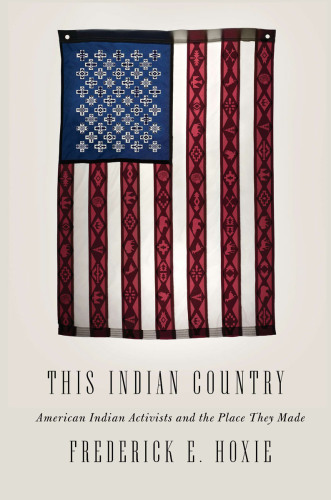oleebook.com
This Indian Country: American Indian Activists and the Place They Made de Hoxie, Frederick E
de Hoxie, Frederick E - Género: English
Sinopsis
A history of Indian political activism told through the inspiring stories of the men and women who defined and defended American Indian political identity
In the newest volume of the award-winning Penguin History of American Life series, Frederick E. Hoxie forms a bold counternarrative to the typical understanding of Native American history. This is not a tale of bloody and doomed battles with settlers and the U.S. Army, which casts Native Americans as mere victims of U.S. expansionism. Instead, This Indian Country describes how, for more than two hundred years, Native American political activists have petitioned courts and campaigned for public opinion, seeking redress and change from the American government.
Hoxie focuses each of his chapters on people who advanced this struggle in important ways. These figuressome famous, many unknown hoped to bridge the distance between indigenous cultures and the republican democracy of the United States...
Descargar
Descargar This Indian Country: American Indian Activists and the Place They Made ePub GratisLibros Recomendados - Relacionados
Reseñas Varias sobre este libro
An overview of the Native American impact on the White Anglo-Saxon Protestant world in America. It was OK. I thought some parts of the book being boring and dry. There was a lot of good information on various leaders, events, and movements in Native American history. native-american17 s Kelli Peters40 11
Frederick Hoxies work in This Indian Country presents a fresh look at the the battle to secure American Indian rights throughout US history. Hoxie argues that there is more to American Indian history than Geronimo, Sitting Bull, and Crazy Horse, and that it is critical historians and students understand the wider history of American Indian activism. Hoxie claims that his work counters the dominant theme of Indian warriors and violent resistance or passive defeat by presenting portraits of American Indians who neither physically resisted, nor surrendered to, the expanding continental empire that became the United States. Throughout his work, Hoxie highlights important American Indian activists from the time of the founding of the United States to the election of 2000. The work is structured by activists and this allows the reader to progress through history and the movement for American Indian rights with the tribes and leaders fighting for those rights. This structure highlights major changes and policy shifts within the movement and by the US government as American Indians proved successful.
1 Bookworm2,049 78
Histories and stories that are just not taught. Had this book for awhile and decided to finally knock it off my list. Author Hoxie looks at the stories of Indian activists and figures that are simply not taught in the US school system unless you take a specific class, have a particular area of study or have a special interest. It's really quite terrible.
Each chapter looks at different people (mostly specific individuals but the fight of the Ojibwe to stay on their land at Mille Lac, Minnesota) and their lives. From their upbringing to what they chose to do plus the historical context and how these individuals were perceived. Some stories are quite sad and it's clear that *many* of the same tactics that one can see being used today towards activists or particular famous figures have been used throughout history, although perhaps not quite in the same form due to the changes in technology and communication.
The information was interesting but the reading was very, very dry and academic. Hoxie's a professor and it shows. While the stories themselves were interesting (especially when placed in context of US history that often ignores these stories), I found the writing really hard to get through. I wonder if maybe I had more knowledge in general it might have helped me.
That said, I don't regret reading it. There are very unfortunate reasons as to why we often don't hear of these struggles and why these names are not as well known to many US people. Just keep in mind that if you're going into this book as a non-specialist you may feel a bit lost/also struggle with it.
I bought it as a bargain book. I'd probably borrow it from the library instead if I did it again but for the right person it probably wouldn't be a bad purchase. I'd also expect it to show up in a syllabus/course/talk on Native Americans, activism, examining the role of the US government, etc.1 Bernadette44 5
If you have already read biographies and histories about American Indian military campaigns that defied federal authority, Hoxie's This Indian Country will add significantly to your knowledge. Instead of focusing on warriors such as Geronimo, Sitting Bull, and Crazy Horse, it highlights tribal leaders, attorneys, authors, and other thinkers who waged war with their pens and voices. About half of the chapters focus on individual people, such as James McDonald, a Choctaw lawyer; William Potter Ross, a Cherokee news editor; Sarah Winnemucca, a Paiute author; Thomas Sloan, an Omaha Lawyer; and Vine Deloria, Jr., a Sioux author and educator. Other chapters focus on small groups, including one on the Mille Lacs Ojibwe who took on the federal government in court. Hoxie's work covers the development of important concepts such as Native sovereignty and self-determination stretching from the early 19th century to the early 21st century, includes people from various geographic regions, and features men and women, making for a well-rounded treatment of the topic. I especially appreciate Hoxie's selection of American Indians with various political persuasions and his depiction of each person in all their complexity. For example, in Chapter 7, we learn of Robert Yellowtail, a pragmatic Crow reservation leader; Alice Jemison, a Seneca activist and news column writer; and D'Arcy McNickle, a federal employee of Cree-Métis descent, each of whom had different stances toward John Collier and the Indian Reorganization Act of the 1930s. To some who would wish that social activists share their current liberal leanings, Jemison in particular may turn out to be a disappointment given her alliances with right-wing, anti-big-government groups. However, honest portrayals of complicated individuals Jemison reinforce the lesson that American Indians are not a monolith. Hoxie's work contributes much to American Indian intellectual and political history; beyond that, This Indian Country is valuable for anyone who wants to attain a deeper understanding of American law and social activism. american-history american-indian native-american ...more K. Wright15
- Would love to read a Canadian equivalent sometime, if any are available. It would be interesting to compare and contrast the hurdles activists faced over the history, where the similarities lay and where differences yawned. Chris91
Does a good job of getting into the legal, policy and political debates and history and how American Indian leaders both responded and made that change.native-american-history Drake McCrary462 2
Interesting subject matter written in the least interesting way possible. It was slob to get through. Paul245 15
It's impossible to understand United States history without understanding Native American history. This Indian Country provides an overview of Native American activists from the birth of the United States to the present. Hoxie does not portray these activists as victims or as infallible heroes. Many of these activists were women. Hoxie also gives good descriptions of the issues affecting. native communities over the past two hundred plus years. On a personal note, my parents knew Vine Deloria. Fredrick Danysh6,844 179
Native Americans have almost always been ignored or exploited by the United States. This work looks at their treatment and lack of recognition since the beginning of the American republic. This was a very informative read and is recommended ffor anyone interested in the hidden side of America.history native-americans Sven186 3
An excellent look at Native American activism from the early 1800s to 2004. I learned so much about the history of US expansion and the people who have striven to survive and prosper in relationship to the US and states.history Robert206
Autor del comentario:
=================================












